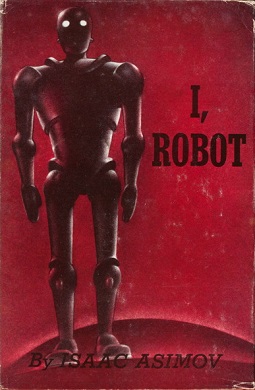
I, Robot is a fixup (compilation) novel of science fiction short stories by American writer Isaac Asimov. The stories originally appeared in the American magazines Super Science Stories and Astounding Science Fiction between 1940 and 1950 and were then compiled into a book for stand-alone publication by Gnome Press in 1950, in an initial edition of 5,000 copies. The stories are woven together by a framing narrative in which the fictional Dr. Susan Calvin tells each story to a reporter in the 21st century. Although the stories can be read separately, they share a theme of the interaction of humans, robots, and morality, and when combined they tell a larger story of Asimov's fictional history of robotics.
Web most often refers to:

Murray Leinster was a pen name of William Fitzgerald Jenkins, an American writer of genre fiction, particularly of science fiction. He wrote and published more than 1,500 short stories and articles, 14 movie scripts, and hundreds of radio scripts and television plays.
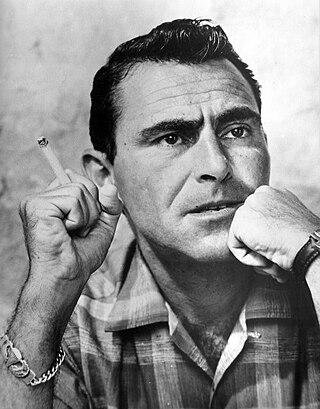
Rodman Edward Serling was an American screenwriter, playwright, television producer, and narrator/on-screen host, best known for his live television dramas of the 1950s and his anthology television series The Twilight Zone. Serling was active in politics, both on and off the screen, and helped form television industry standards. He was known as the "angry young man" of Hollywood, clashing with television executives and sponsors over a wide range of issues, including censorship, racism, and war.

Pebble in the Sky is a science fiction novel by American writer Isaac Asimov, published in 1950. This work is his first novel — parts of the Foundation series had appeared from 1942 onwards in magazines, but Foundation was not published in book form until 1951. The original Foundation books are also a string of linked episodes, whereas this is a complete story involving a single group of characters.

William Anthony Parker White, better known by his pen name Anthony Boucher, was an American author, critic, and editor who wrote several classic mystery novels, short stories, science fiction, and radio dramas. Between 1942 and 1947, he acted as reviewer of mostly mystery fiction for the San Francisco Chronicle. In addition to "Anthony Boucher", White also employed the pseudonym "H. H. Holmes", which was the pseudonym of a late-19th-century American serial killer; Boucher would also write light verse and sign it "Herman W. Mudgett".
Escape is an American radio drama. It was radio's leading anthology series of high-adventure radio dramas, airing on CBS from July 7, 1947 to September 25, 1954.
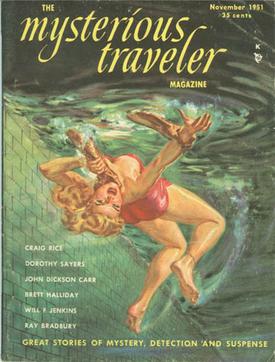
The Mysterious Traveler was an anthology radio series, a magazine, and a comic book. All three featured stories which ran the gamut from fantasy and science fiction to straight crime dramas of mystery and suspense.

Dimension X was an NBC radio program broadcast mostly on an unsponsored, sustaining basis from April 8, 1950, to September 29, 1951. The first 13 episodes were broadcast live, and the remainder were prerecorded. Fred Wiehe and Edward King were the directors, and Norman Rose was heard as both announcer and narrator, opening the show with: "Adventures in time and space... told [or transcribed] in future tense..." For two months, beginning on July 7, 1950, the series was sponsored by Wheaties.

X Minus One is an American half-hour science fiction radio drama series that was broadcast from April 24, 1955, to January 9, 1958, in various timeslots on NBC. Known for high production values in adapting stories from the leading American authors of the era, X Minus One has been described as one of the finest offerings of American radio drama and one of the best science fiction series in any medium.
U.S. television science fiction is a popular genre of television in the United States that has produced many of the best-known and most popular science fiction shows in the world. Most famous of all, and one of the most influential science-fiction series in history, is the iconic Star Trek and its various spin-off shows, which comprise the Star Trek franchise. Other hugely influential programs have included the 1960s anthology series The Twilight Zone, the internationally successful The X-Files, and a wide variety of television movies and continuing series for more than half a century.
Ziv Television Programs, Inc. was an American production company that specialized in productions for first-run television syndication in the 1950s.
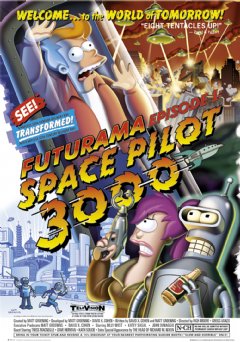
"Space Pilot 3000" is the pilot episode of the American animated television series Futurama. It originally aired on the Fox network in the United States on March 28, 1999. The episode focuses on the cryogenic freezing of the series protagonist, Philip J. Fry, and the events when he awakens 1,000 years in the future. Series regulars are introduced and the futuristic setting, inspired by a variety of classic science fiction series from The Jetsons to Star Trek, is revealed. It also sets the stage for many of the events to follow in the series, foreshadowing plot points from the third and fourth seasons.

An anthology series is a radio, television, video game or film series that spans different genres and presents a different story and a different set of characters in each different episode, season, segment, or short. These usually have a different cast in each episode, but several series in the past, such as Four Star Playhouse, employed a permanent troupe of character actors who would appear in a different drama each week. Some anthology series, such as Studio One, began on radio and then expanded to television.
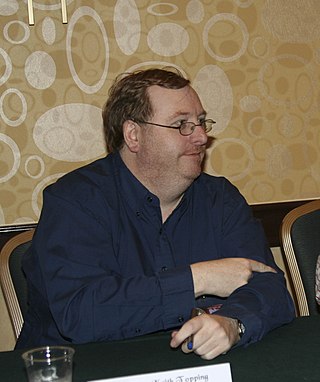
Keith Andrew Topping is an author, journalist and broadcaster. He is most well known for his work relating to the BBC Television series Doctor Who and for writing numerous official and unofficial guide books to a wide variety of television and film series, particularly Buffy the Vampire Slayer.
The science fiction writer Robert A. Heinlein (1907–1988) was productive during a writing career that spanned the last 49 years of his life; the Robert A. Heinlein bibliography includes 32 novels, 59 short stories and 16 collections published during his life. Four films, two TV series, several episodes of a radio series, at least two songs and a board game derive more or less directly from his work. He wrote a screenplay for one of the films. Heinlein edited an anthology of other writers' science fiction short stories.
"The Time Trap" is the twelfth episode of the first season of the American animated science fiction television series Star Trek. It first aired in the NBC Saturday morning lineup on November 24, 1973, and was written by American actress and screenwriter Joyce Perry.
"The Veldt" is a science fiction short story by American author Ray Bradbury. Originally appearing as "The World the Children Made" in the September 23, 1950, issue of The Saturday Evening Post, it was republished under its current name in the 1951 anthology The Illustrated Man.

Tales of Tomorrow is an American anthology science fiction series that was performed and broadcast live on ABC from 1951 to 1953. The series covered such stories as Frankenstein starring Lon Chaney Jr., 20,000 Leagues Under the Sea starring Thomas Mitchell as Captain Nemo, and many others.
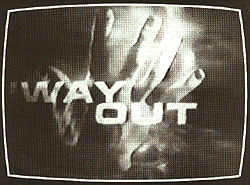
'Way Out is a 1961 American horror, fantasy, and science fiction television anthology series hosted by writer Roald Dahl. The macabre black-and-white 25-minute shows were introduced by Dahl, his face projected in a disconcerting hall of mirrors effect, dryly delivering a brief introductory monologue, expounding on such unusual subjects as undertakers or frogs or murdering a romantic rival with ground tiger's whiskers.













